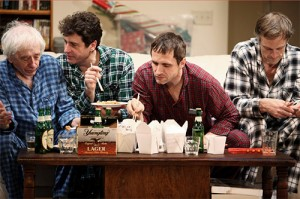By MARK BLANKENSHIP
When you hear about a play called
Straight White Men, what do you think it's going to be? Which cultural and political assumptions do you think it's going to challenge? Which audience members do you think it's going to unsettle?
Whatever you're thinking, you're right: That's exactly what Young Jean Lee is doing with her new play. But she's also doing the opposite. In fact,
Straight White Men, which is now at the Public, wants to make everyone face their assumptions and hypocrisies about privilege in America, no matter who they are.
"I don't want to alienate anyone too much, but I don't want to make anyone feel too comfortable either," says Lee, who both wrote and directed the show. "A lot of time was spent on, 'How do we keep white people from getting too comfortable?' and 'How do we keep people of color or women or queers from getting too comfortable?'"
From a certain perspective, of course, the play seems innocuous. Though Lee is known for experimental dramas like
Untitled Feminist Show and
Songs of the Dragons Flying to Heaven,
Straight White Men is her first naturalistic piece.
Consider the plot: In three scenes, a father and his three adult sons celebrate Christmas in the family room. Amid casual conversation about the neighbors and a few rounds of brotherly horseplay, the oldest son, Matt, becomes unbearably sad. As they try to comfort him, the rest of his family reveals their judgments about his place in the world.
So… you know. Basic family drama. That paragraph could describe fifty percent of the plays on Broadway in any given season.
But then there's the stuff
around the play. During the preshow, for instance, hip-hop music blares through the room, with an emphasis on female rappers. Meanwhile, the curtain speech is delivered by a trans person in Lee's theatre company, who promises the actors will jump off stage and intimidate people whose phones go off.
And during the show, scene changes become silent performances of their own, with a crew of non-white and non-male stagehands rearranging furniture and props with an almost ritualistic precision.
"It's all very aggressive," says Lee, who was born in Korea before immigrating to the States at a young age. "It was a way of saying, 'This is my play and my space, and the people who are behind the show are not straight white men.' There's a different perspective behind it."

That's one way to keep a straight white audience from getting too complacent. Then there are the characters themselves.
Crucially, these men are all decent: They obviously love each other, and they're trying their best to treat everyone with respect. They even grew up playing a homemade board game called "Privilege," which doled out penalties for entitled behavior. (That ought to delight white audience members who consider themselves enlightened.)
But things get less pleasant when the family reacts to Matt, who is arguably the most committed to negating his own privilege. Lee uses these responses to prod a remarkable number of contradictions in white liberal thinking.
She also lets characters say loaded things about minorities, and she admits that she feels personally implicated by lines like, "Women and minorities may get to pretend they're doing enough to make the world a better place just by getting ahead, but a white guy's pretty hard pressed to explain why the world needs him to succeed."
Yet for all this,
Straight White Men isn't a merciless screed. We're still watching a loving family celebrate the holidays. We're still looking at a family room filled with homemade Christmas stockings and comfy furniture.
These cozy touches remind us that privilege doesn't exist in a theoretical universe, but in the actual world where people live and work and care about each other. Discussing the set, Lee says, "It's my family room. There's this moment where they open up the laundry closet, and there are all these jumbo snacks and laundry detergent, and the audience laughs because they've seen all that before.
"For me, that room just felt like home and family and America in a way that I identify with very strongly."
---
Mark Blankenship is TDF's online content editor
Photo by Julieta Cervantes

